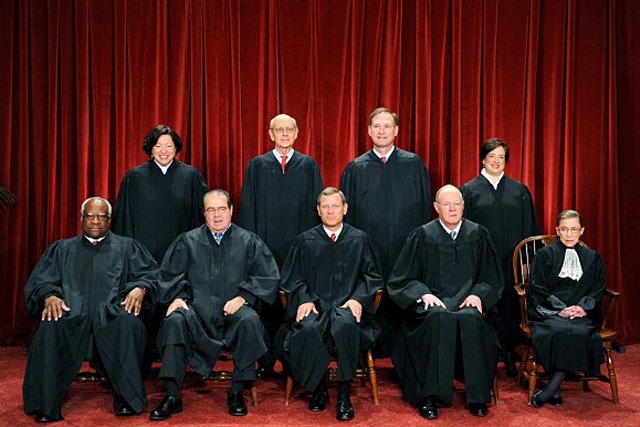
by: Lauren Gailey, Associate Editor
While thousands of college students in Pittsburgh and across the nation enjoyed time off for spring break last week, the United States Supreme Court was hard at work. Between March 3 and March 10, 2014, the Court decided six cases, making the week one of its busiest of October Term 2013.
Law v. Siegel (No. 12-5196, March 4, 2014):
When a debtor filed for Chapter 7 bankruptcy, he claimed a $75,000 homestead exemption under California law. The bankruptcy court granted the trustee’s motion to make those funds available to pay the attorney’s fees he had incurred as a result of the debtor’s fraudulent misrepresentations regarding a lien. The Supreme Court held that the bankruptcy court had exceeded its authority in ordering that the $75,000 protected by the exemption could be used to pay the trustee’s expenses.
Lawson v. FMR LLC (No. 12-3, March 4, 2014):
Former employees of private companies that contracted to manage or advise mutual funds alleged retaliation for blowing the whistle on their employers’ putative fraudulent management of the funds. They argued that they had a claim against their former employers under the whistleblower protections of the Sarbanes-Oxley Act of 2002. The Supreme Court reversed the First Circuit’s holding that the Act applied only to public companies’ employees, concluding that its whistleblower protections applied to the private contractors and subcontractors of public companies as well.
Lozano v. Alvarez (No. 12-820, March 5, 2014):
A mother who had been living in London with her daughter and the child’s father left with the child for a women’s shelter in 2008, alleging that she had been physically and emotionally abused. She and the child left the U.K. in July 2009 and eventually settled in New York. The father did not locate the child until November 2010, more than 16 months after she and her mother had left the U.K. The father filed a petition for the child’s return under the Hague Convention on the Civil Aspects of International Child Abduction, which had been enacted into U.S. law in 1988. The Convention provided that a petition filed by a parent within one year of the child’s removal required “the return of the child forthwith,” but a petition filed after the one-year period was subject to an exception for cases in which “the child is now settled in its new environment.” The district court denied the father’s petition on those grounds, and the court of appeals affirmed. The Supreme Court affirmed, holding that the drafters of the Convention did not intend to make equitable tolling of the one-year period available in cases in which the abducting parent conceals the child’s location from the other parent.
Rosemond v. United States (No. 12-895, March 5, 2014):
A criminal defendant challenged his conviction for aiding and abetting the crime of using or carrying a gun in connection with a drug trafficking offense. The Supreme Court held that in order to establish such aiding and abetting, the government must prove that the defendant actively participated in the underlying drug trafficking or violent crime and knew in advance that his confederate would use or carry a gun in the process. Because the jury instructions failed to make clear that the defendant was required to know of his confederate’s plans to use or carry a gun before the crime, when the defendant would still have had time to withdraw, the Court held that the instructions were erroneous.
BG Group PLC v. Republic of Argentina (No. 12-138, March 5, 2014):
When an Argentine entity in which a British firm had a majority interest became unprofitable after an amendment to one of Argentina’s laws changed the currency upon which tariffs were calculated, the British firm sought arbitration in Washington, D.C. The British firm claimed that the change to the Argentine law violated an investment treaty between Britain and Argentina. Although Argentina argued that the arbitrator thus lacked jurisdiction because the British firm had violated the treaty’s local litigation requirements, the arbitration panel concluded that Argentina’s conduct had excused those requirements and awarded damages to the British firm. Both sides sued in federal court. The British firm sought to confirm its award under the New York Convention and Federal Arbitration Act (FAA), and Argentina to vacate the damage award on the grounds that the arbitrators did not have jurisdiction over the dispute under the FAA. The Supreme Court was called upon to decide who, in a dispute involving a multi-stage dispute resolution process, determines whether a precondition to arbitration has been satisfied: the court or the arbitrator. The Court held that, under the framework used in ordinary contract disputes, arbitrators are primarily responsible for interpreting and applying local litigation requirements, and courts should be deferential in reviewing their determinations. The Court further held that the arbitrators’ findings in this case were lawful.
Marvin M. Brandt Revocable Trust v. United States (No. 12-1173, March 10, 2014):
In 1976, the federal government conveyed land to the Brandt family, subject to the right of way of the railroad that crossed it. After the railroad abandoned the right of way, the Brandts argued that, under the General Railroad Right-of-Way Act of 1875, the railroad’s right of way was an easement that was extinguished upon the abandonment of the railroad. The Court agreed, holding that the land belonged to the Brandts and not to the government. Justice Sotomayor, the lone dissenter, disagreed with the majority’s analysis and expressed concern that it “undermine[d] the legality of thousands of miles of former rights of way that the public now enjoys as means of transportation and recreation.” This, Justice Sotomayor warned, could lead to expensive litigation over abandoned rails that have been converted to trails.
Lauren Gailey covers the Supreme Court beat for Juris Blog. She holds a B.S.B.A. in Marketing and a B.A. in Communication and Rhetoric from the University of Pittsburgh, and she looks forward to adding a J.D. from the Duquesne University School of Law in June 2014.